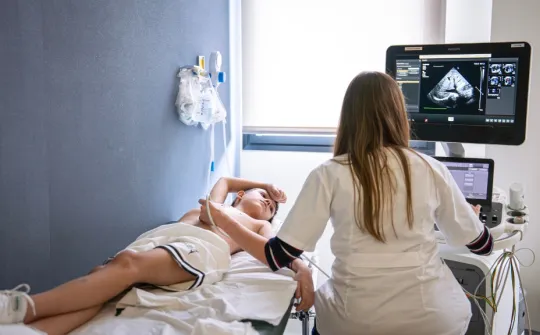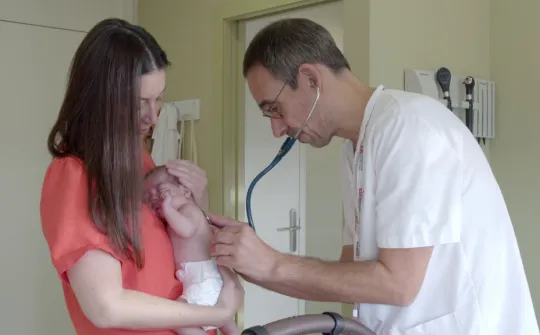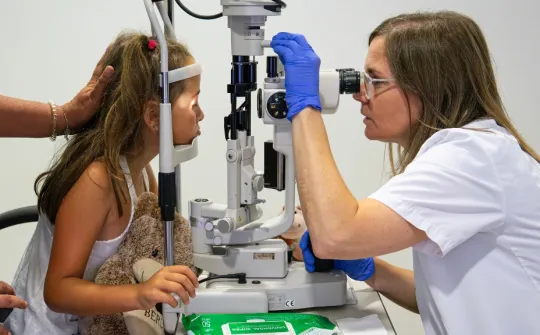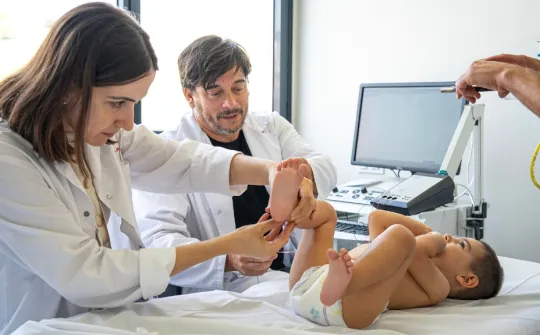‘Our specialism is magical, because we do not just have one patient, but two, and we have to safeguard the wellbeing of both of them’
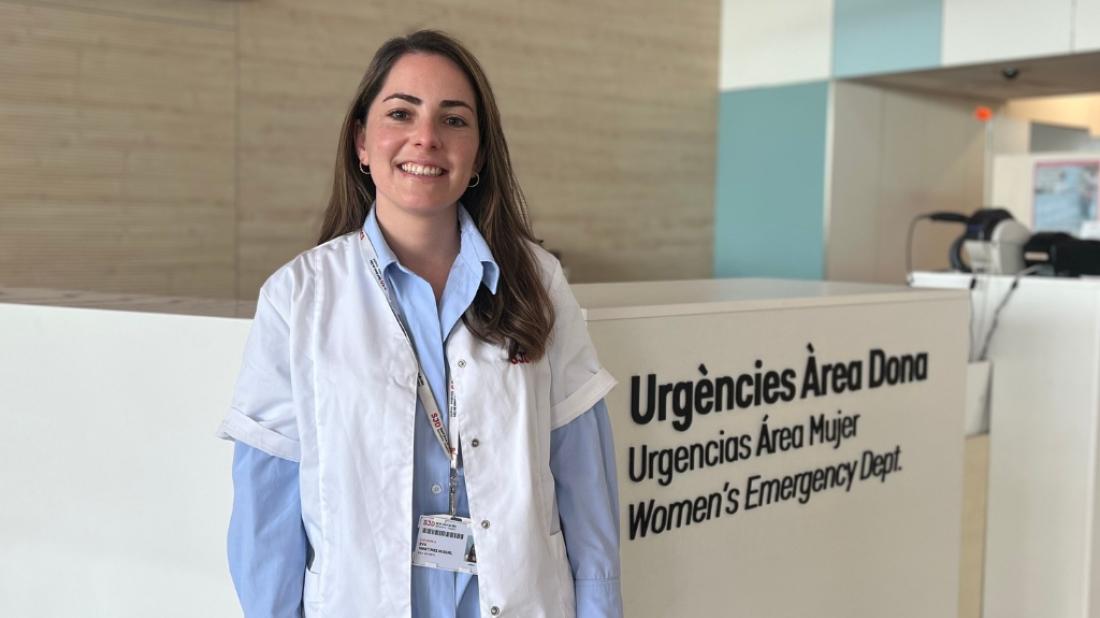
Eva Martínez, a midwife at SJD Barcelona Children’s Hospital for the last seven years, tells us about her daily routine at the Hospital, how the midwifery team works, and the treatment of mothers coming to give birth at the Hospital and their newborns.
In 2018, Eva Martínez—originally from Navarra—chose SJD Barcelona Children’s Hospital as where she would do her midwifery nursing residency. Impressed by the nursing team, the Hospital's specialisation and the values of care and hospitality that they promote, she decided to stay here to work. She is currently a midwife in the Hospital's birthing unit, and her role is to assist mothers and, consequently, their newborns from the moment contractions begin, until both mother and baby are stable enough for transfer to the ward for recovery.
For Eva, treating the more than 3,000 women who come to the Hospital each year to give birth during such a vulnerable, special moment in their lives means going above and beyond their call of duty.
What is the daily routine of a midwife like?
Like any part of the Hospital, which never stops working, we look at what is left to do from the previous shift and anything that needs to be followed up. We also check how full the six birthing units we have at the Hospital are and, depending on what is planned for the day, each midwife is assigned to one or two mothers. Outside of the birthing units, we also have to tend to the patients in the induction ward, or deal with medication and operations in the surgical wing.
We are with the mothers from the moment their contractions begin, during dilation, through to the birth and right up until they are stable and ready to be discharged to the ward. There are no set time frames involved; it largely depends on each individual patient. Plus, we try to encourage skin-to-skin contact after the birth because that's when the parent-child bond starts to form. It’s also when we start breastfeeding, if that's what the mother has chosen.
Would you say that a midwife’s work is predictable?
Not at all, every birth is unique and different. The mothers arrive and they decide how they want to approach the birth. Many ask for an epidural, but there are some who prefer nitrous oxide, relaxation techniques, or even those who choose the birthing pool we have in one of the units. Actually, we are starting a project that involves providing care during water births. The warm water makes the body relax, so some women prefer to keep moving when in the water.
Regarding hospital facilities, one thing I really like is that the mothers do not have to be transferred between several rooms. It all takes place in the same room, from dilation right through to the birth. This is a way of ensuring they are comfortable.
Midwives are not just there to physically support the mother.
When you think of a midwife, you inevitably think of deliveries, but it’s much more than that. We have to deal with emotional, psychological, social and even cultural needs. Each person has their own story and baggage, and when they come here, you are the one who spends the most time with them during one of the most important days of their life. It is a huge challenge, and sometimes we score a perfect ten and other times not so much, but we always try to make sure our patients do not feel alone in such a vulnerable moment of uncertainty.
Do you have any stories you'd like to share?
I remember one birth we had not long ago. The father was travelling and couldn't make it back. Everything went well, thankfully. The nurses were able to do a videocall so that he could be there, in some way, during the birth of his child. It was very emotional. Sometimes the circumstances don't line up, but we always try to make the experience as special as we can.
‘I think highly of how the specialism is approached at SJD Barcelona Children's Hospital. The compassionate caregiving and solid teamwork really put us on another level’
What do you like most about your job?
One of the things I like most, and I think it doesn't apply to other specialisms, is that we do not just have one patient, but two—the mother and her baby. So the care we give to the mother benefits both her and her baby's well-being.
I also think highly of how this specialisation is approached at SJD Barcelona Children's Hospital. The compassionate caregiving and solid teamwork, for me, really put us on another level. Even though each person has a specific role, we encourage communication to better coordinate and help each other when the need arises. That way, we can give our patients the dedicated care they need at all times.
Was that what made you decide to stay here?
All that definitely helped me decide. My residency years were great. I was able to learn and enjoy that culture of compassionate caregiving and companionship that is promoted here at the Hospital. We work in a high-complexity medical facility, which allows us to learn so many things. But really, it was feeling like I was at home here that made me decide to stay in Barcelona and continue working for a hospital that is really on my side. It's a true gift to be able to repay that faith in me by caring for the women who come here, and making sure they feel safe and protected.
What is the birth rate like at SJD Barcelona Children's Hospital?
We can proudly say there are lots of babies being born here. The facilities are a huge help: they are modern, welcoming and cheerful. Having your own private room, a top-notch neonatal ICU—if needed—or different departments all within easy reach really puts you at ease. And, obviously, the compassionate care we provide, always respecting our patients’ autonomy as if they were a member of our own family. Right now, the mothers come in with a birth plan, and as long as there are no risks to their health in doing so, we follow their plan.
Is the specialist nature of the Hospital advantageous to mothers?
I would say so. We are experts in mother and child healthcare, which, to a certain extent, guarantees fantastic care provision. We also have staff who are dedicated to research and technological advancements. If we combine science with the compassionate caregiving and values of our team, it's the perfect balance.
In that sense, we also see how people value the opinion of SJD Barcelona Children's Hospital. Many families who are told their child could have some kind of disease come for a second opinion from the staff working here—despite having had their pregnancy monitored at another hospital. We really like that, because it tells us they trust our expertise.
How has the role of midwife changed?
Since I started, I think midwifery has taken a more human approach by focusing more on caring for the mother and the baby. It has also gained some degree of autonomy, in that we can offer our patients more cohesive, professional care, informing them of each and every procedure. At SJD, there are so many ways to develop our skills and specialise, and to take part in different projects. At the end of the day, we are different from gynecology, for example, so we have different jobs to do and different criteria to follow when completing these jobs. Each person has a role to play, but there is always smooth, transversal communication. That way, things always turn out quite well.
